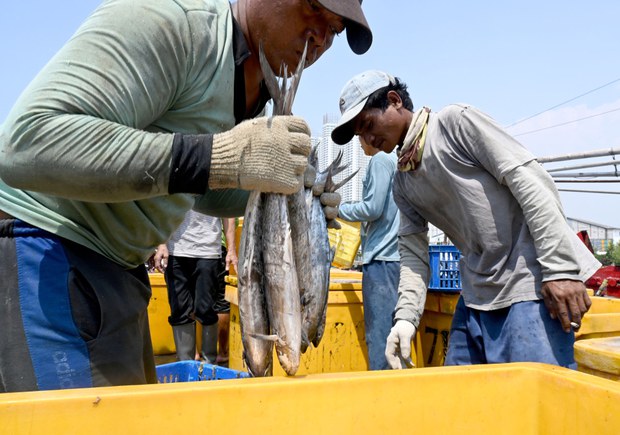Indonesia Says it Seeks to Protect Migrant Fishermen from Forced Labor
2019.12.10
Jakarta
Indonesia’s government is taking steps to protect workers in the fishing industry, including 22,000 Indonesians aboard Taiwanese boats, a maritime affairs official said Tuesday, a day after Greenpeace reported that nearly three dozen had been subjected to “forced labor.”
The government recognizes that there is a lack of clear regulations on the recruitment and placement of workers on domestic and foreign fishing boats, said Basilio Dias Araujo, a senior official at the Coordinating Ministry for Maritime Affairs.
“The government is aware that there are many cases of human trafficking, forced labor and modern slavery at sea in the fishing sector, both on national and foreign boats,” Basilio told BenarNews.
He said the National Team for the Protection of Seafarers and Fishing Ship Crew Members, which was formed within the last year, was working to improve training and protection. Existing laws on sea navigation and fishermen protection do not specifically address the issue of local and migrant workers working as crew members on fishing boats.
“This will be a fundamental and comprehensive overhaul in the fisheries sector, which had been overlooked in the past. We are looking at a new regulation being issued,” Basilio said.
The study released Monday by Greenpeace Southeast Asia and the Indonesian Migrant Workers’ Union (SBMI) revealed that 34 Indonesian migrant fishermen working on 13 suspected foreign fishing boats had reported unsatisfactory conditions.
“Four main complaints have been identified: deception involving 11 foreign fishing vessels; withholding of wages involving nine foreign fishing vessels; excessive overtime involving eight foreign fishing vessels; physical and sexual abuse involving seven foreign fishing vessels,” the 52-page report, “Seabound: The Journey to Modern Slavery on the High Seas,” stated.
Indonesian migrant fishermen had their salaries deducted to pay guarantee deposits and processing costs for the first six to eight months of their employment, forcing them to work ridiculous hours for little or no pay, it said.
Greenpeace said the study involved reviewing documentation including contracts, complaints filed, salary schedules, passports and plane tickets.
Citing the Taiwan Fisheries Agency, the report said 21,994 migrants from Indonesia and 7,730 from the Philippines were working on Taiwanese boats operating in distant waters as of June 2019.
These two countries combined represent the majority of migrants on Taiwan’s distant water fleets – a $2 billion industry and one of the top five distant water fishing fleets on the high seas, Greenpeace said.
“Reports documenting the experiences of Indonesian and Filipino migrant fishers reveal a common pattern throughout the recruitment process, the terrible working conditions onboard vessels, as well as the uncertainty of repatriation when vessel operators are caught violating fishing laws in foreign countries,” it said.
Crew member turns advocate
Zaenudin, an Indonesian who worked as a crew member on a Taiwanese fishing boat, told BenarNews about his experience while working off Fiji.
For seven months beginning in October 2017, Zaenudin said he worked under inhumane conditions and experienced harsh treatment from superiors and cooks.
“The conditions and food on the ship were not adequate. Every night at work we were only given fish boiled with salt and rice to eat,” he said.
Zaenudin, who had to pay his own way back to Indonesia, is dedicated to advocating for victims of forced labor at sea.
“I have chosen to help fellow fishing boat workers because I don’t want them to go through what I did. I know how it feels to be treated cruelly,” he said.
An SBMI official said workers were not the only ones who were hurt.
“Events like these have created family disputes that sometimes ended in divorce because the workers came home empty-handed,” said Maizidah Salas, SBMI coordinator of education and socialization.
Greenpeace said dwindling fish populations were forcing boats to travel farther, resulting in higher operation costs and increasing the possibility of exploitation of migrants.
The NGO urged members of the Association of Southeast Asian Nations (ASEAN), particularly governments in the Philippines and Indonesia, to take actions to end what it called modern slavery.








